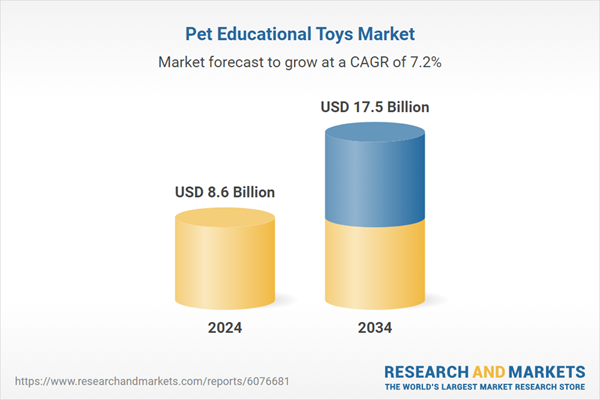Among toy categories, balls generated USD 2.7 billion in revenue in 2024 and are expected to reach USD 5.9 billion by 2034. Their wide appeal lies in their instinctive play value and versatility. Dogs and other pets are naturally drawn to the round shape, making balls essential tools for improving coordination, agility, and endurance. These toys also support alertness, problem-solving, and reaction time, turning simple play into an enriching developmental experience. Chew toys remain another essential category, especially for pets prone to anxiety or destructive behaviors. These toys help redirect unwanted chewing habits while improving dental hygiene by massaging gums and reducing plaque buildup.
In terms of material, rubber toys accounted for a dominant 41.3% market share in 2024. Their high durability and resistance to wear make them ideal for heavy chewers and active pets. Many rubber toys come with grooves or textured designs that enhance oral health, making them a practical choice for long-term use. Nylon toys are also favored for their strength and longevity, reducing the need for frequent replacements. Additionally, materials like cotton and plastic continue to offer varied sensory experiences, catering to different pet preferences and needs.
The United States pet educational toys market reached USD 2.4 billion in 2024. U.S. consumers are prioritizing enrichment-driven purchases as pet adoption rates and premiumization trends continue to rise. Owners actively seek toys that meet the unique mental and physical health needs of their pets across breeds, ages, and activity levels.
Key brands leading this market include ZippyPaws, OurPets Company, SmartPetLove, Outward Hound, BarkBox, PetSafe, Planet Dog, Trixie Pet Products, Pet Qwerks, Petstages, KONG Company, Nina Ottosson, West Paw Design, Starmark Pet Products, and Kyjen Company, Inc. To capture greater market share, these companies are innovating through eco-friendly designs, puzzle-based mechanisms, and treat-dispensing features that increase engagement. Strategic collaborations with veterinarians and pet behaviorists are helping refine toy functionalities for health and cognitive outcomes. Direct-to-consumer sales via e-commerce and high-impact social media marketing are further enhancing brand visibility and consumer loyalty.
Comprehensive Market Analysis and Forecast
- Industry trends, key growth drivers, challenges, future opportunities, and regulatory landscape
- Competitive landscape with Porter’s Five Forces and PESTEL analysis
- Market size, segmentation, and regional forecasts
- In-depth company profiles, business strategies, financial insights, and SWOT analysis
This product will be delivered within 2-4 business days.
Table of Contents
Companies Mentioned
The companies featured in this Pet Educational Toys market report include:- BarkBox
- KONG Company
- Kyjen Company, Inc.
- Nina Ottosson
- OurPets Company
- Outward Hound
- Pet Qwerks
- PetSafe
- Petstages
- Planet Dog
- SmartPetLove
- Starmark Pet Products
- Trixie Pet Products
- West Paw Design
- ZippyPaws
Table Information
| Report Attribute | Details |
|---|---|
| No. of Pages | 487 |
| Published | April 2025 |
| Forecast Period | 2024 - 2034 |
| Estimated Market Value ( USD | $ 8.6 Billion |
| Forecasted Market Value ( USD | $ 17.5 Billion |
| Compound Annual Growth Rate | 7.2% |
| Regions Covered | Global |
| No. of Companies Mentioned | 16 |









